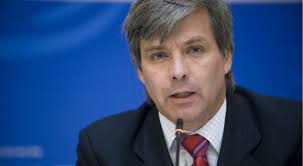By Andrew Warshaw
May 10 – Harold Mayne-Nicholls, the FIFA-appointed official who led the inspection team that evaluated the credentials of all 2018 and 2022 World Cup bidding candidates – only to be later banned for requesting work placements at Qatar’s famed Aspire academy – is back in football.
Mayne-Nicholls has been appointed executive vice-president of Colo Colo, a top-flight club in his native Chile which celebrates its centenary in 2025.
In July 2017, Mayne-Nicholls became free to resume his footballing career after the Court of Arbitration for Sport cut his ban for seeking unpaid intern work for relatives to two years.
Because of the ruling, the former Chilean Football Association president had served his time, his original seven-year ban for “repeatedly asking for personal favours” from the Qataris having already been trimmed to three years by the FIFA appeals committee.
“I am really motivated,” Mayne-Nicholls told Iinsideworldfootball by email. “With much more experience and almost nine years out of the game, I want to work hard to develop all the projects we have.”
“There is a lot to do: renovate our stadium, try and find a company interested in naming rights; supervise the youth programmes and Colo Colo on the international map.”
Mayne-Nicholls, who has spent the last few years running a charity in Chile, always felt he had been harshly treated and grew increasingly frustrated that it took 10 months to release the written grounds for his ban which held up his appeal to CAS.
He still believes, as do many familiar with his case, that his punishment never fitted his supposed crime.
“I am sure I was not treated in the same way as others,” he said. “I never received anything. I just sent a couple of emails asking for something I was prepared to pay for. But it’s over now. A new challenge has arrived and that’s the only important thing that matters.”
Mayne-Nicholls still sticks by his evaluation report which famously gave Qatar the worst ranking of all candidates for the 2022 World Cup saying it was a “high risk” option. His advice was ultimately ignored by the Fifa executive committee, most of whose voting members in the December 2010, ballot have now departed the scene.
The fact that 2022 will, uniquely, be staged in winter vindicates, he says, his warning about stifling summer temperatures.
“I still maintain that for global football as a whole, January/February would have been better than November/December,” said Mayne-Nicholls.
“What is definitely the case is that June was impossible and I still can’t understand how the exco voted at first to run the tournament in summer. Having said that, I have no doubt Qatar will do a great job.”
He warns, however, against the finals being expanded to 48 teams, an idea Fifa president Gianni Infantino is trumpeting ahead of a final ruling at the Fifa Congress next month.
“When I did my report, even 32 teams was very difficult to imagine in Qatar…48 is much more complicated unless you invite some of Qatar’s neighbours to work together.”
“In purely footballing terms, I’m not sure either that more finalists will mean better quality. It will give a great boost to the game in some countries, of course, but a price could be paid.”
Contact the writer of this story at moc.l1734907607labto1734907607ofdlr1734907607owedi1734907607sni@w1734907607ahsra1734907607w.wer1734907607dna1734907607

